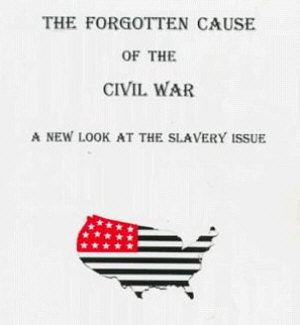Real Cause of Civil War Obscured in 150th Anniversary Recollections
Ft. Sumter Attack, April 12-13 1861, Civil War Exploded in the U.S.
April 17, 2011
By: Dave Rogers
 Dr. Lawrence R. Tenzer, "The Forgotten Cause of the Civil War" issued by Scholars Publishing House.
Dr. Lawrence R. Tenzer, "The Forgotten Cause of the Civil War" issued by Scholars Publishing House.
Out of thousands of books on the Civil War, only a few mention what some authors consider the real cause: the threat of white slavery to the working men of the North.
The primary source of that "news" is a book by Dr. Lawrence R. Tenzer, "The Forgotten Cause of the Civil War" issued by Scholars Publishing House in 1997.
Dr. Tenzer wrote that under the Fugitive Slave Act of 1850, runaway slaves could be reclaimed without due process, which in effect allowed for free whites to be mistakenly seized, commenting: "The very real possibility existed that enslavement could be extended to the lower class of white laborers as well."
"By bringing new light to bear on slavery and other race-related issues, Tenzer believes his work will help to heal the many racial wounds which are still festering in this country," wrote one reviewer.
The major unanswered question since the war has always been: why would millions of Northern men who considered Negroes inferior and did not support abolition put themselves in harm's way in the Union Army? Is the threat of white slavery the answer to that question?
"Republicans feared that the slaveholders' domination of the federal government threatened to undermine the liberty of white men in the North," wrote Graham Alexander Peck in the Journal of the Abraham Lincoln Association in 2007.
Writers North and South recently have been eminently clear: the war was not about state's rights, the tariff or geographical conflicts. Fifteen Southern states actually held conventions to whip up pro-slavery and secession sentiment out of fear that Lincoln's election was a threat to the system of slavery.
The issue was a long time in development. Henry Clay has been famously quoted, by a Vermont Member of Congress, Charles Rich, as saying in 1820 during the Missouri debates:
"If gentlemen will not allow us to have black slaves, they must let us have white ones; for we cannot cut our fire-wood and black our shoes, and have our wives and daughters work in the kitchen."
Unfortunately for historians, no record was made of the speeches in Congress during that discordant period even though Clay was said to have gone on four hours in one address.
Twenty-four years later, during the Presidential election campaign of 1844, Senator Clay vehemently denied making such a statement. His denial was dutifully reported by Robert Remini in his hagiography "Henry Clay: Statesman for the Union."
Clay had long since gone to his grave when the issue of white slavery became the main rallying cry of the new Republican Party in 1856. Republican Campaign Bulletin No. 9 in 1856 stated: "The laws of the slave states justify the holding of white men in bondage."
Another Republican campaign document quoted the Muscogee, Alabama, Herald:
"Free society! We sicken of the name. What is it but a conglomeration of GREASY MECHANICS, FILTHY OPERATIVES, SMALL FISTED FARMERS AND moonstruck THEORISTS?
"All the Northern, and especially the New England States, are devoid of society fitted for well-bred gentlemen. The prevailing class one meets with, is that of mechanics struggling to be genteel, and small farmers who do their own drudgery; and yet who are hardly fit for association with a Southern gentleman's body servant. This is your free society which the Northern hordes are endeavoring to extend into Kansas."
Dr. Tenzer quotes Lincoln who referred to slavery "regardless of color" during a speech in Chicago in 1856 and in other speeches. Lincoln reported to his Northern audiences that Southern newspapers, such as the Richmond Enquirer, claimed "their slaves are far better off than Northern freemen." He urged defeat of Southern attempts to make slavery "a ruling element in our government."
The issue was explored by the eminent historian Carl Schurz is his 1890 biography of Clay, who commented: "If such opinions and expressions can fall from that honorable gentleman (Clay), what ideas do you suppose are entertained of laboring men by the majority of slave-holders!"
Those opinions soon became clear with the cannon bombardment of Ft. Sumter and the subsequent carnage of four years costing 620,000 lives.
###